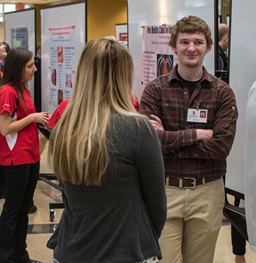
Professional Development
The Graduate School is committed to the professional development of our graduate students through scholarships, research and events.
Thrive in Your Career
Professional development is an essential part of graduate education. The Graduate School, in coordination with departments across campus, provides the necessary resources for graduate students to succeed in both the academic and non-academic world. Outside of the classroom, USD offers a range of development tools through scholarships, research, events and recognition through distinguished awards. You will find scholarships related to your program, participate in student research opportunities and master new skills through quality graduate programs.
Career Training

Compete for cash prizes
An 80,000 word thesis would take over 9 hours to present... you get 3 minutes!
Do you want to compete for cash prizes and the opportunity to participate in the Midwestern Association of Graduate Schools (MAGS) 3MT® competition at their spring annual meeting?

Celebrated Research, Creative Scholarship and Academic Engagement
Take advantage of the opportunity to showcase your talent, hard work and passion for your field of study at IdeaFest.
Grad Research & Creative Scholarship Grants
Excellence Awards
Excellence in Teaching
The Graduate Excellence in Teaching Award recognizes the exemplary contributions of graduate students who support the teaching mission of the University of South Dakota. The award, administered by the Graduate School, recognizes graduate students who have demonstrated excellence in teaching to undergraduate or graduate students at USD.
Two awards will be given to graduate students based on the highest ranking. The first ranked student will receive a $600 honorarium and the second ranked student will receive a $400 honorarium. If selected, recipients will be nominated for the Midwestern Association of Graduate Schools (MAGS) Excellence in Teaching Award.
The Application Process
Applicants will go through a competitive process that involves a comprehensive overview of their research to the Graduate Council for consideration.
Applications must be submitted electronically as a single pdf file by e-mail to [email protected].
2026 DEADLINE: Friday, December 5, 2025
The USD winners will be nominated by the Graduate School to the Midwestern Association of Graduate Schools (MAGS) 2026 Excellence in Teaching Award. Additional material and criteria are required. Please visit the MAGS Excellence in Teaching Award webpage for additional details.
Eligibility
The following requirements must be met before submitting your application.
- The graduate student must be enrolled in credit-bearing courses during the current calendar year and be in good academic standing.
- The graduate student must have served as a Teaching Assistant (Graduate Teaching Assistant or Graduate Teaching Assistant – Instructor of Record) or taught courses during the calendar year of 2025.
- The graduate student must demonstrate how their teaching methods, instructional design, or practices in the classroom promote effective student learning and engagement.
- The graduate student must show evidence of promoting intellectual growth and effective mentorship of their students.
- The graduate student must indicate efforts to enhance student learning objectives via novel pedagogical research practices, or teaching/learning scholarship.
Application Materials
- Current Curriculum Vitae
- Letter of support from the nominating department chair (includes description of any departmental and institutional honors awarded to the student for excellence in teaching
- Nominee’s teaching portfolio (maximum of 6 pages double spaced and 12-point font with one-inch margins)
- Statement of teaching philosophy [15 points].
Please convey your core ideas about being an effective teacher. Share your values and beliefs related to teaching and learning. Discuss your goals and the methods or strategies you use to achieve those goals. - Evidence of instructional design for improved student learning [30 points].
In your experience as an instructor, explain how you have used instructional design to develop learning materials, experiences, activities, and environments that promote better student learning. This could include content production, learning activities, student-instructor interaction, peer-to-peer interaction, and effective assessments, among other things. - Video of you “Teaching in Action” (10 minute maximum) [30 points]. Use a video clip for a collegiate level course or above to demonstrate how you have implemented key elements of your teaching philosophy and instructional design. A variety of teaching settings may be used for the video including but not limited to lecture, facilitated discussion, lab, etc. as appropriate to the course. The focus should be on activities that demonstrate exceptional or innovative instruction or student learning, such as student engagement, personalizaed learning, project-based learning etc. For asynchronous online courses, a video presentation by the instructor of key engaged learning activities, or learning environments, would be an example of good evidence.
- Video Instructions - MAGS Teaching Award Video Instructions.pdf
- Evidence of Effective Student/Colleague Mentoring [10 points]. Describe your experience with mentoring students outside of the classroom, whether that be related to the courses you teach or in other settings. Additionally, discuss any experience you have with mentoring your peers or colleagues in the context of teaching.
- Evidence of Professional Development [15 points]. Explain how you have used professional development opportunities to improve your teaching skills. If appropriate, how have you aligned professional development with the feedback you have received on your teaching?
- Statement of teaching philosophy [15 points].
Review Process
A committee of the Graduate Council will review applications received by the deadline. This committee will review, score and make final recommendations to the Graduate School.
For more information, contact the Graduate School at 605-658-6173 or by email at [email protected].
Recognizing Original and Significant Contributions
The Graduate School is soliciting nominations for the Council of Graduate Schools (CGS)/ProQuest Distinguished Dissertation Awards for 2026. These dissertation awards are made annually to individuals who, in the opinion of the award committee, have completed dissertations representing original work that makes an unusually significant contribution to their disciplines.
The Council of Graduate Schools allots the Distinguished Dissertation Awards in two of four categories that alternate every two years.
2026 CYCLE: Mathematics, Physical Sciences & Engineering; and the Social Sciences
2027 CYCLE: Biological Sciences/Life Sciences and Humanities and Fine Arts
The USD winners will be submitted to the CGS awards at the CGS Annual Meeting in December 2026. If chosen as a winner at the GCS grants a $2,000 award and a trip to accept the award at the annual meeting. Reasonable travel expenses of award recipients will be covered by CGS.
2026 DEADLINE: Friday, April 25, 2026 by 11:59 p.m.Nominating a Student
- Ask the student if they agree to be nominated.
- Three letters of recommendation evaluating the significance and quality of the nominee’s dissertation work. One of these letters is to be from the nominee's dissertation supervisor, another from a member of the nominee's dissertation committee, and the third from a person of the nominee's choice. These letters are to be attached to the nomination.
- An abstract of the nominee’s dissertation (not to exceed 5 double-spaced pages). The Graduate School can retrieve this information. Appendices containing other material, such as charts, tables, and/or references, may be included as additional pages. All pages should be numbered, and each should bear the name of the nominee.
The nominee’s curriculum vitae (not to exceed five pages).
Eligibility
- The effective date of the degree awarded, or the completion of doctoral degree requirements and dissertation, must lie in the period of July 1, 2024 to June 30, 2026, inclusive, for each nominee selected. At USD this would be summer 2024 through spring 2026.
- To be considered, a dissertation must contain original work that makes an unusually significant contribution to the discipline.
- If a dissertation is multi- or interdisciplinary in nature, a significant portion of the work must be comprised by at least one of the 2026 fields of competition.
- To be eligible nominees dissertation must be available in the ProQuest depository.
Categories
Mathematics, Physical Sciences and Engineering
Mathematics, statistics, computer sciences, data processing, systems analysis, chemistry, earth sciences, physics, geology, meteorology, astronomy, metallurgy, geophysics, pharmaceutical chemistry; aeronautical, architectural, biomedical, ceramic, chemical, civil, and electrical engineering sciences; environmental health engineering; geological, mechanical, mining, nuclear, and petroleum engineering.
Social Sciences
Agricultural economics, geography, anthropology, archaeology, economics, education, sociology, government (political science), demography, and psychology.
Biological Sciences/Life Sciences
Biology, botany, zoology, ecology, embryology, entomology, genetics, nutrition, plant pathology, plant physiology, anatomy, biochemistry, biophysics, microbiology, pathology, pharmacology, physiology, and related fields (health sciences). Also included are agriculture, forestry, zoology, and related fields
Humanities and Fine Arts
History; philosophy; language; linguistics; literature; archaeology; jurisprudence; the history, theory and criticism of the arts; ethics; comparative religion; and those aspects of the social sciences that employ historical or philosophical approaches.
For more information, contact the Graduate School at 605-658-6173 or by email at [email protected].
Recognizing Research at the Master's Level
The Graduate School is soliciting nominations for the Midwestern Association of Graduate Schools (MAGS) Distinguished Masters Thesis Awards for 2026. The awards are to recognize and reward distinguished scholarship and research at the master’s level.
MAGS awards the Distinguished Thesis Awards in two of four categories that alternate every two years.
2026 CYCLE: Biological / Life Sciences and Humanities
2027 CYCLE: Social Sciences and Mathematics, Physical Sciences and Engineering
The USD winner from each category will be submitted to the MAGS awards. If chosen as a winner at the MAGS awards, a $750 honorarium will be received and a trip to accept the award at the MAGS 82nd Annual Meeting in Kansas City,MO, March 25-27, 2026. The faculty mentor or thesis advisor will also be invited to attend the presentation ceremony, but their expenses will not be covered.
Nominating a Student
- Ask the student if they agree to be nominated.
- Write a letter of recommendation (to be attached to the nomination form). The letter should include the following:
- What is the thesis about, summary?
- What is new with respect to state-of-the-art (or existing) works?
- Strength of the thesis.
- What can we take from this thesis? Point out a few domains/disciplines, where the idea/tool can be employed.
- Include the month/year of the student’s graduation (must be master’s degree)
- The effective date of the master’s degree award, or the completion of master’s degree requirements, must fall in the period of July 1, 2023 to June 30, 2025, inclusive, for each nominee selected. At USD this would be summer 2023 through spring 2025.
- The Graduate School will locate the thesis and abstract to complete the nomination.
Eligibility
- Original works accepted by an institution “in lieu of thesis” (such as musical compositions, published books, works of art, computer software, etc.) may not be nominated.
- To be considered, a thesis must contain original work that makes an unusually significant contribution to the discipline. It must be in a format that conforms to accepted disciplinary standards, and it must have been accepted as final by the degree-granting institution.
- Since the intent of the competition is to recognize scholarship by students who are pursuing their first graduate research degree, individuals who received a Ph.D. (or comparable research degree) in any discipline prior to the writing of the master’s thesis are not eligible. However, recipients of a first professional degree awarded prior to the writing of the thesis may be nominated.
Categories
Mathematics, Physical Sciences and Engineering
Mathematics, statistics, computer sciences, data processing, systems analysis, chemistry, earth sciences, physics, geology, meteorology, astronomy, metallurgy, geophysics, pharmaceutical chemistry; aeronautical, architectural, biomedical, ceramic, chemical, civil, and electrical engineering sciences; environmental health engineering; geological, mechanical, mining, nuclear, and petroleum engineering
Social Sciences
Agricultural economics, geography, anthropology, archaeology, economics, education, sociology, government (political science), demography, and psychology
Biological Sciences/Life Sciences
Biology, botany, zoology, ecology, embryology, entomology, genetics, nutrition, plant pathology, plant physiology, anatomy, biochemistry, biophysics, microbiology, pathology, pharmacology, physiology, and related fields (health sciences). Also included are agriculture, forestry, zoology, and related fields
Humanities and Fine Arts
History; philosophy; language; linguistics; literature; archaeology; jurisprudence; the history, theory and criticism of the arts; ethics; comparative religion; and those aspects of the social sciences that employ historical or philosophical approaches
For more information, contact the Graduate School at 605-658-6173 or by email at [email protected].
